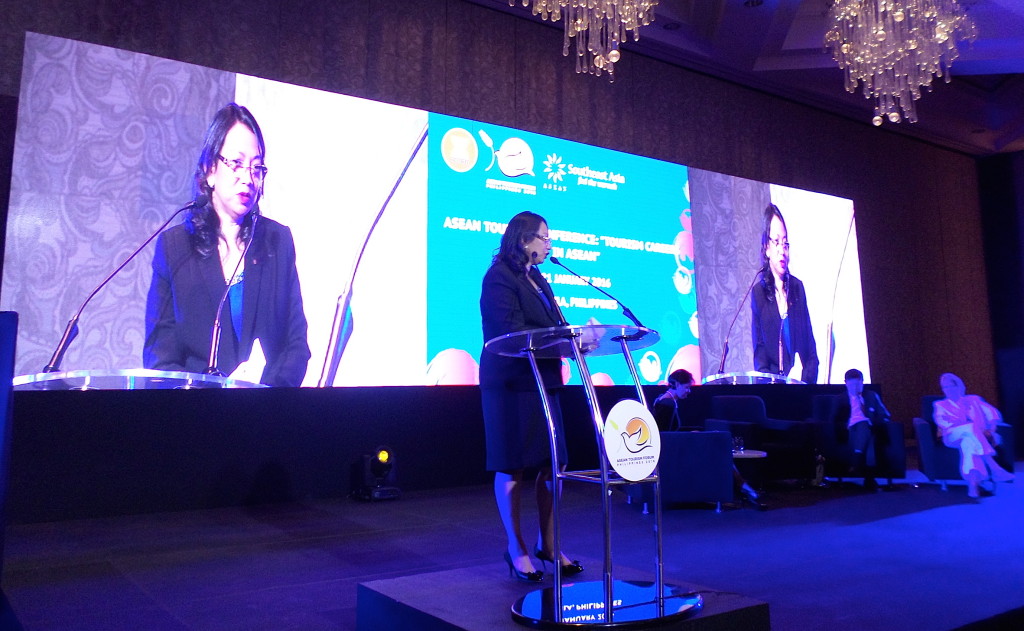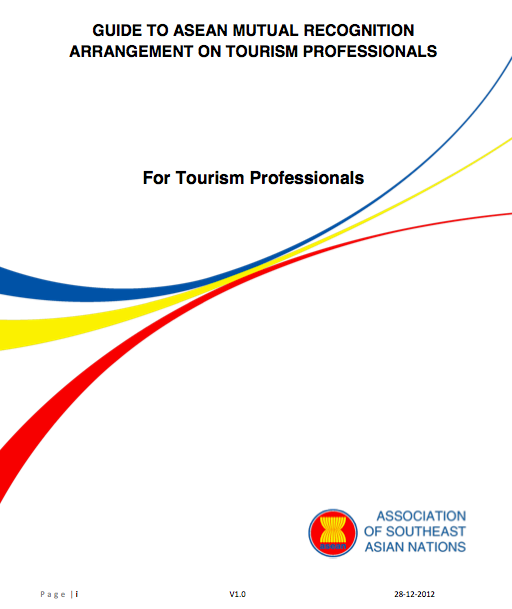
21 Jan, 2016
Shangri-La hotel’s HRD director flags downsides of tourism labour mobility under ASEAN integration
MANILA – The ASEAN Mutual Recognition Agreement, designed to liberalise movements of tourism professionals within the 10-member regional bloc, could cause potentially serious side-effects in the travel & tourism sector, the Human Resources Director of Shangri-La Hotels and Resorts in the Philippines has warned.
Speaking at the ASEAN Tourism Conference (ATC), one of the core events of the ASEAN Tourism Forum being held in Manila between Jan 18-22, Ms Sheila Marie O. Sepulveda forecast increased labour turnover in certain ASEAN countries, a talent drain, internal pay inequalities and higher costs of doing business.
All of this could be exacerbated by a “dilution of culture”, she cautioned, without elaborating.

Ms Sepulveda delivering her speech at the ASEAN Tourism Conference.
The theme of the ATC, “Tourism Careers in ASEAN,” was designed to help focus on one of the key challenges facing a rapidly growing tourism industry which is widely recognised as holding considerable promise for job-creation and income distribution.
However, with the ASEAN region having more than enough airports, hotels, convention centres and other travel & tourism infrastructure to keep growing in the new era of integration, the big concern now is whether it will attract and retain enough qualified “software” to run all that “hardware.”
The entire ASEAN Tourism Strategic Plan 2016-25, due to be unveiled on Jan 22, is driven by the Vision statement, “By 2025, ASEAN will be a quality tourism destination offering a unique, diverse ASEAN experience, and will be committed to responsible, sustainable, inclusive and balanced tourism development, so as to contribute significantly to the socio-economic well-being of the ASEAN people.”
However, none of that will materialise in the absence of across-the-board well-trained, committed and motivated manpower to deliver the all-important service that underpins the industry.
Speakers and several commentators from the floor noted that travel & tourism was growing perhaps a bit too fast for its own good. Although the Asia-Pacific and ASEAN regions do have large pools of talented young job-seekers, they have a choice of many other economic sectors and industries in which to work.
|
|
In that context, the objective of the ASEAN Mutual Recognition Agreement for Tourism Professionals (MRA–TP) is “to facilitate mobility of tourism professionals within ASEAN based on competence-based tourism qualifications/certificates, and at the same time, improve the quality of services delivered by tourism professionals.”
A guide published to explain the initiative says, “When ASEAN nations mutually recognise each other’s qualifications this will encourage a free and open market for tourism labour across the region and boost the competitiveness of the tourism sector in each ASEAN nation, while at the same time attracting needed talent to meet local skills shortages. The eligibility to work in a host country will of course be subjected to prevailing domestic laws and regulations of the host country.”
Addressing the topic, “An Industry Perspective on the ASEAN for Tourism Professionals,” Ms Sepulveda agreed that the “framework” did open up potential opportunities. However, she said that true mobility would need to be accompanied by harmonised local labour policies, clarity of labour rights and terms of employment and other facilities such as one-stop-shop visa and work permits.
On the positive side, she noted that countries could take the opportunity to create incentives for their respective migrant diasporas to return home and share their knowledge. This was taken as a reference to the millions of Filipinos working in places such as the Middle East who would have no problem finding jobs in tourism.
She said there would be more intra-ASEAN competition for jobs. The Shangri-La hotel in Manila gets 10,000 applications a year from college graduates but has only 100 positions available. She said 60% of the Shangri-La’s personnel in the Philippines are women.
Ms Sepulveda also called for more industry awareness about the MRA-TP. In preparation for her speech, she said, she had consulted her HRD counterparts at other Shangri-La hotels in ASEAN as well as industry leaders in Manila. Many of them had never heard of it.
Although the governments and the academic community have invested a lot of effort in advancing the cause of the MRA-TP, “sad to say, we feel so ignorant about it.”
She also urged a simplified version of the MRA-TP documentation. “We were trying to understand this. Just the (ASEAN) acronyms were mind-boggling.”




Liked this article? Share it!